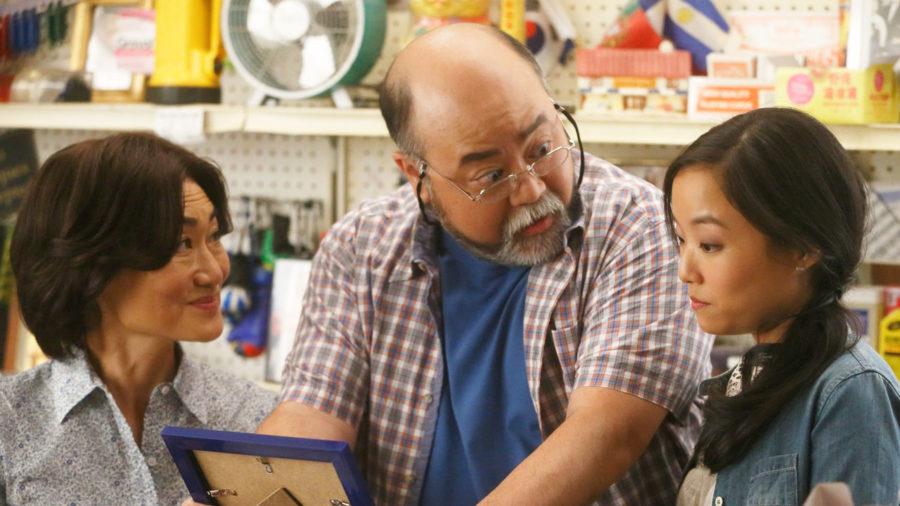After two successful seasons on Canadian television, Kim’s Convenience came onto U.S. audiences’ radars rather abruptly last summer when the series debuted on Netflix. The story of the Kim family, consisting of parents Appa and Umma ("Dad" and "Mom") and their children Janet and Jung, appealed to Korean-American audiences for its relatable depiction of an immigrant family. With the added benefit of the show’s strong humor and universal themes that appealed to a wide audience, the half-hour-long Canadian sitcom quickly elevated to international success. For the American audience, waiting for the third season to drop on Netflix was a torturous eternity. But as of April 5, the wait is over.
Following last season’s rather abrupt finale, in which Jung and Shannon’s will-they-won’t-they relationship hit a snag after Jung and his father Appa’s attempt at reconciliation was spoiled by their pride, this season seemed fated for a dramatic start. This made the premiere episode, “New Appa-liance,” a welcome return when it turned out the central conflict was Umma, Jung’s mother, shopping for a new dishwasher and Appa, owner of the eponymous grocery store, haggling for a good price. On paper this seems an odd choice to begin the series a year after the last installment, but the episode seamlessly incorporates typical Kim family shenanigans into the aftermath of the season two finale. There was also a touching final scene in which Jung and Appa tentatively make up (made hilarious by Umma, who is too distraught over the two of them breaking the new dishwasher to appreciate this).
Paul Sun-Hyung Lee and Jean Yoon’s chemistry, honed since 2011 when the Kim family debuted in Ins Choi’s original play Kim’s Convenience, was on full display this season. Some of the strongest storylines came from Umma and Appa’s various antics in and around the store, including a stereotypically “Appa” storyline in which he schemes to steal the Wi-Fi password from the fitness center next door, or one in which Umma had to fix all the signs in the store after Appa made an embarrassing spelling error. This season also took the time to give the audience some moments of genuine heart between the two, though not without some of the show’s trademark light humor thrown in for good measure. In “Open Kimunication,” a highlight of the season, the two ended up in a couples counseling session led by Pastor Nina, where Appa has a breakthrough about his childhood and is (somewhat unwillingly) pulled into a healing circle.
Even among a strong supporting cast, Pastor Nina stands out. After making a lasting impression in her debut last season, Amanda Brugel’s character has integrated herself nicely into the Kims’ lives, featuring in some of the season’s funniest plotlines. Possibly the best one is in “Thy Neighbour’s Wifi,” where she ends up as a guest at the Kims’ viewing party for Korean dramas and is indoctrinated into the genre. Andrew Phung’s Kimchee also got some strong development this season: Now promoted to assistant manager (Jung’s old position) at Handy, Kimchee gets a taste of some real responsibility and the various pitfalls that come with it. The surprisingly touching episode “To Him It May Concern” reads like a typical sitcom and involves a visit from Kimchee’s mother, during which he tries to hide his continued friendship with Jung from her.
Things started to become less entertaining and more annoying with Jung’s sister Janet’s storylines. Although Andrea Bang’s performance is, as always, excellent, her character’s experiences this season seem centered on the recurring theme of getting into trouble due to some miscommunication or her own selfishness. It’s clear that this served to portray the pitfalls of becoming independent, but it was frustrating to watch Janet get stuck in more or less the same situation every episode. She did have some great moments, though, including a climactic scene in the finale that served to end an otherwise lackluster storyline involving her and her former boyfriend Raj, and a touching subplot in the premiere where she tried to change her name to make herself more unique. Otherwise, her character felt stagnant for much of the season.
The same can be said about Simu Liu’s Jung: Again, Liu’s performance is amazing, but this season was missing real consequences for Jung’s actions in the season two finale, and continued communication with Appa after they tentatively made up in the premiere. The episode “The Kim Cup” offered a glimpse at their continued tensions, but was the only moment besides the premiere in which the two interacted. Still, Liu’s chemistry with Nicole Power’s Shannon continued to entertain.
Despite some lows, this season of Kim’s Convenience is ultimately full of highs. The lead cast continues to convincingly depict the daily lives of a Korean immigrant family, while the show’s spot-on humor offers laugh-out-loud moments in every episode. It was nice to see the subtle touches the writers added as a way of recognizing their representation-mindful audience, including a fun sequence delivered almost entirely in Korean and a moment where Appa and Umma, after spending a whole episode arguing about spelling English words, genuinely forget what a word means in Korean. Though some of the show’s more dramatic themes from last season got buried, Kim’s Convenience delivered a season of humor and heart. Next year, American viewers will surely be waiting torturously, once again, for the season to finish airing in Canada so that it can drop on Netflix.









